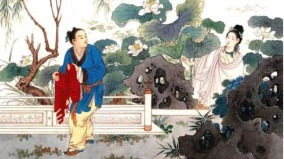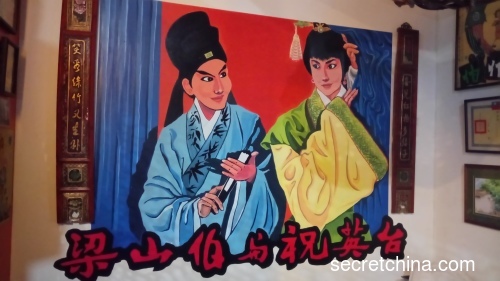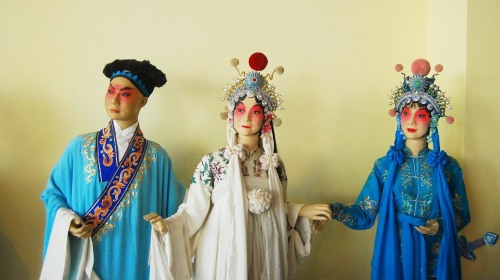
[ad_1]
In the story of Meng Jiangnu crying at the Great Wall,Qin ShihuangTaking the blame for the Ming emperor. (Drawing: Winnie Wang/Look at China)
In ancient China, there were four majorloveThe legend is still well-known today:Meng JiangnuCry the Great Wall,Cowherd and Weaver Girl,Liang ShanboandZhu Yingtai,as well asThe Legend of White Snake. Generations of Chinese people have combined their beautiful imagination of love withSadnessMemories are all entrusted to these four lovesstoryinside. However, have you ever thought about it: After hundreds of thousands of years of dissemination, these stories have been rewritten countless times, and have they become “changed beyond recognition”? After long-term and standardized interpretation, have the original meanings of these stories been distorted?
if you don’tFollow others’ opinionsIf you think carefully about the storylines that you have been familiar with since childhood, you will surely discover a lotIt’s scary to think about it carefullyThe details are hidden behind the story.

In fact, Meng Jiangnu was born hundreds of years earlier than Qin Shihuang, so it is impossible for the two to share the same stage. (Image source: Adobe Stock)
The first one: The story of Meng Jiangnu
Let’s first talk about the story of Meng Jiangnu. In this story, the most iconic plot is “crying down the Great Wall”, but in fact, in the earliest historical records, this woman was praised precisely for not shedding tears easily and for following etiquette extremely.
According to the research of historian Gu Jiegang, the story of Meng Jiangnu was derived from Qiliang’s wife in “Zuo Zhuan”. “Zuo Zhuan” records that Qi Liang died in battle with the Marquis of Qi. When the Marquis of Qi returned, he met Qi Liang’s wife in the suburbs and expressed his condolences and condolences to her. Qi Liang’s wife disagreed and said that according to etiquette, you should come to my home to formally express condolences.
When her husband died, although she was very sad, she still requested that condolences be carried out according to the etiquette of the time, without any ambiguity. This is a model of a woman who knows etiquette and restraint. Therefore, intellectuals in the Spring and Autumn Period recorded her words and deeds.
The magic happens later. In the circulation of the past dynasties, this simple story has been continuously added to the story, and the image of Qiliang’s wife has also undergone subversive changes.
In the Tang Dynasty, Qiliang’s wife, who was originally nameless, had her own name, Meng Jiangnu. Her husband Qiliang (called Wan Xiliang in some places) is no longer a general who died on the battlefield, but a civilian husband who was captured for avoiding service and built inside the city wall. In order to find her husband, Meng Jiangnu cried to the city and cried down the Great Wall.
The climax of the spread of this story occurred in the Ming Dynasty. The popular story of Meng Jiangnu in the Ming Dynasty incorporated the entanglement between Qin Shihuang and Meng Jiangnu into the plot. It was said that Meng Jiangnu fell down the Great Wall in tears and was reported to Qin Shihuang and summoned. After Qin Shihuang saw Meng Jiangnu, he became interested. Meng Jiangnu put forward conditions for burying her husband. Most people think that there were three conditions: building a bridge, burying him, and Qin Shihuang personally conducting the funeral. After finishing them one by one, Meng Jiangnu committed suicide by drowning.
So far, Meng Jiangnu has changed from the unknown woman who knew etiquette in “Zuo Zhuan” to a fierce woman who is loyal and dares to confront the powerful.
But the worst thing is that of Qin Shihuang. The image of a heroic figure was completely destroyed in this far-reaching story. In fact, Meng Jiangnu was born hundreds of years earlier than Qin Shihuang, so it is impossible for the two to share the same stage.

The stories of Cowherd and Weaver Girl all involve the Cowherd stealing clothes. (Picture source: Internet picture)
Second: The story of the Cowherd and the Weaver Girl:
The story of the Cowherd and the Weaver Girl is one of the origins of Chinese Valentine’s Day, the Chinese Valentine’s Day. In terms of influence, it definitely ranks first among the four major love stories. Because it is so influential, people’s feelings about this story can easily be deflected by humanistic and unorthodox interpretations.
In the interpretation of human hearts, the focus is on the happy life of the Cowherd and the Weaver Girl being ruthlessly torn apart by the Emperor of Heaven/Queen Mother, who are regarded as representatives of feudal forces. We listened to this story over and over again, which eventually inspired us to hate and criticize the feudal power.
Few people would think about it from another angle: In a country that attaches great importance to personal morality, why is it that a young farmer’s behavior of peeping at women bathing and stealing women’s clothes was not criticized but instead praised?
The story of Cowherd and Weaver Girl is now a voyeur + fetishist + thief + illegal abduction and imprisonment of a girl. It is such a plot that accumulates a bunch of gangster crimes, but it is packaged into a poignant long-distance love story. It can only be said that the Chinese people and the grassroots have always had different understandings of gangsters.
In China, there are many versions of the story about the Cowherd and the Weaver Girl, but most of them have the plot of the Cowherd “hiding his clothes to protect himself from the Girl.”
After the Cow Girl got married, or even gave birth to two or three children, the Cowherd would carefully hide the clothes he had stolen so that the Weaver Girl would not find them, while the Weaver Girl tried every possible means to get her clothes back. This piece of clothing is equivalent to Weaver Girl’s flying machine. Once found, she will fly away.
It can be seen that there is no love between the Weaver Girl and the Cowherd, but only a relationship of coercion and coercion.
The story of the Cowherd and the Weaver Girl circulated after the Ming Dynasty began to beautify this love affair in which the gangster imprisoned the girl. The Weaver Girl whose clothes were stolen not only did not escape, but also fell in love with the Cowherd at first sight. The husband and wife farmed and the girl weaved happily. The Emperor/Queen Mother who had previously upheld justice now became the villain.
A coercive marriage that was originally unspeakable has been rewritten to successfully shift the focus of the story by using a feudal and anti-feudal confrontation model.

“Liang Shanbo and Zhu Yingtai” is one of the four major folk legends in China. (Photography: yihsin)
The third one: The story of Liang Shanbo and Zhu Yingtai
Under the banner of anti-feudalism, the most misunderstood story is the story of Butterfly Lovers. Zhu Yingtai, who disguised herself as a man, formed a deep friendship with Liang Shanbo, her classmate for three years. When they parted, Zhu Yingtai pretended to have a younger sister and promised to marry Liang Shanbo, implying that Liang Shanbo would propose marriage in 10 days, but Liang Shanbo mistakenly thought it was 30 days.
Thirty days later, when Liang Shanbo came to Zhu’s house to propose marriage, Zhu Yuanwai had already betrothed Zhu Yingtai to the local son Ma Yuanwai, and a date had been set for the wedding. When Butterfly Lovers met, they were filled with sorrow and sadness, but they could not change the reality.
After leaving the Zhu family, Liang Shanbo fell ill and died with regret. On the way to marry Zhu Yingtai in the Ma family, Zhu Yingtai insisted on saying goodbye to Liang Shanbo’s grave and was allowed to do so. Zhu Yingtai cried bitterly to pay homage to Liang Shanbo. At that time, there was a heavy storm and the tomb cracked. Zhu Yingtai jumped into the tomb and died of love.
In later versions, Butterfly Lovers transformed into butterflies, giving the legend a tragic and happy ending, which is in line with the aesthetic psychology of the Chinese people.
The story of Butterfly Lovers is regarded as a typical example of resistance to feudal arranged marriage. Zhu Yingtai was betrothed to Ma Yuanwai’s son, implying that Zhu Yuanwai was greedy for money and would not hesitate to sacrifice his daughter’s happiness. This is also considered to be the Ma family using wealth and power to bully others, while the Zhu family is greedy for money and power and bullies women.
But judging from the original version of the Butterfly Lovers drama, the Zhu family and the Ma family are of the same family, and there is no suspicion of being superior to each other. Moreover, the Zhu family allowed Yingtai to study in disguise, and the Ma family allowed Yingtai to pay homage to Liang Shanbo on the way to her wedding. Both were very rare decisions, which shows that both parents were quite liberal at the time.
As for parental arranged marriage, it was the main form of marriage institution before modern times. We cannot impose the current concept of marriage on the ancients.
Both Butterfly Lovers themselves believed from the beginning to the end that marriage must be based on the matchmaker’s words and the orders of the parents.
According to the interpretation of Zhu Suli, a legal historian, Liang Zhu “slept in the same bed and slept with his feet tied” when they were classmates. If they really advocated freedom of marriage, they could cook the raw rice into cooked rice; but Zhu Yingtai must go home, We must wait for Liang Shanbo to propose marriage according to the procedures. After Liang Shanbo learned that Zhu Yingtai was a girl and had been promised to marry into the Ma family, he only expressed deep regret and prepared to marry Zhu Yingtai’s fictitious sister when they parted. However, when he discovered this hope When he failed, Liang Shanbo “could not give up”.
At this time, Zhu Yingtai still said, “This life is no longer possible. I advise you to stop thinking about it.” She insisted on respecting the traditional marriage procedures and systems. In the end, the two said goodbye sadly. The whole play shows no pressure or coercion exerted by Zhu Yuanwai or Ma Yuanwai on Zhu Yingtai.
It can be seen that Liang and Zhu have always been law-abiding people in the traditional marriage system. Even if they faced the unfavorable result of not getting married, they never planned to challenge this system.
Zhu Yingtai finally decided to die for love, which was caused by Liang Shanbo’s unexpected death. It was a sudden accident.
Modern people package Liang Zhu as a rebel of the traditional marriage system, and vilify the parents of the Zhu family and the Ma family, treating them as stubborn evil forces of traditional marriage. This is essentially an interpretation model that goes above and beyond. Anyone who is familiar with history knows that traditional marriage, which is mainly characterized by the principles of parental arrangement and equal match, has had its historical rationality for a long time. We cannot rely on the hindsight of today to force the foresight of the ancients.

The images of the three protagonists in the Peking Opera The Legend of White Snake: Xu Xian, White Snake, and Xiao Qing. (Image source: Wikipedia)
Fourth: The story of White Snake and Xu Xian
Influenced by many film and television dramas adapted from The Legend of White Snake, we are very familiar with and stereotyped the story of The Legend of White Snake. To put it simply, although Bai Niangzi is a snake demon, she has cultivated into a good wife and mother. In order to repay her kindness, she risked her life to save Xu Xuan (Xu Xian). However, Fahai does not understand love and insists that humans and monsters cannot fall in love, so they break up the couple abruptly. Model couple.
This kind of story is in line with modern people’s aesthetics of free love, but again, this is a plot that was formed very recently.
The earliest white snake stories are actually full of horror. Among the legends of the Tang Dynasty, there is “The Story of the White Snake”, which tells the story of a man named Li Huang in Longxi who was seduced by a beautiful woman in white mourning clothes and came to her home to “stay there for three days, drink and enjoy herself.” When he returned home on the fourth day, his body turned into blood. The family went to look for the beautiful woman in white and found that she had been transformed by a “snake demon”.
In the Song Dynasty and the Ming Dynasty, there were storybooks “The Three Pagodas of the West Lake” and Feng Menglong’s “The White Snake Forever Guards the Leifeng Pagoda” respectively. The plot of the White Snake story is basically complete, but the main points of the story are completely different from our current understanding.
White snake stories from the Song and Ming dynasties all emphasized lust. The demonic nature of the White Snake has not disappeared. She once threatened Xu Xuan and said: “I tell you the truth now, if you listen to my words and be happy, everything will stop. If you have an evil intention, the whole city will be filled with blood and everyone will be killed.” Those who climb the waves with their hands and step on the muddy waves will all die.”
“The White Snake Forever Guards Leifeng Pagoda” uses the example of Xu Xuan who cannot resist the temptation of sex and has a rough life to warn the world:
I advise the world to stop loving sex. People who love sex will be fascinated by sex.
If your heart is upright, evil will naturally not disturb you. How can there be evil in your body?
But Xu Xuan was involved in lawsuits and trouble because of his love for sex.
If it wasn’t for the old monk who came to rescue him, the white snake would have swallowed him and left nothing behind.
At this time, Fahai’s image is also positive, subduing the snake demon and admonishing men to abstain from sex and not to lust after women, otherwise the consequences will be serious.
It was not until the Qing Dynasty that the White Snake story completed its final round of major revisions and was finalized. The biggest change is that the White Snake has changed from a snake demon to a snake fairy, while the monk Fa Hai has changed from a positive character to a negative character, from a person who originally rescued the world to a sinful person who destroys a beautiful life.
Conclusion: China’s four major love stories, why are they so scary to think about?
The above common understanding of China’s four major love stories is all related to the so-called anti-feudalism. The First Emperor of Qin, the Emperor of Heaven/Queen Mother, Fahai, and the parents of the Zhu family and the Ma family in the story of Liang Zhu were all flogged as representatives of feudal forces.
In fact, although this simple binary interpretation of the story helps modern Chinese to score two more points in exams in order to cater to modern mutated ideas, it conceals the purpose of the divine culture and the theme of the story itself. .
Editor in charge: Fang Cha
Short URL:
All rights reserved. Reprinting in any form requires permission from this site. It is strictly prohibited to create mirror websites.
[Honorary Members Wanted]Streams can merge into the sea, and small kindnesses can achieve great love. We sincerely recruit 10,000 honorary members from Chinese people all over the world: each honorary member only needs to pay a subscription fee per year and become an honorary member of the “Look at China” website, which can help us break through censorship and blockade and provide services to at least 10,000 mainland Chinese compatriots. Provide independent and true key information to warn them in times of crisis and save them from great plagues and other social crises.






